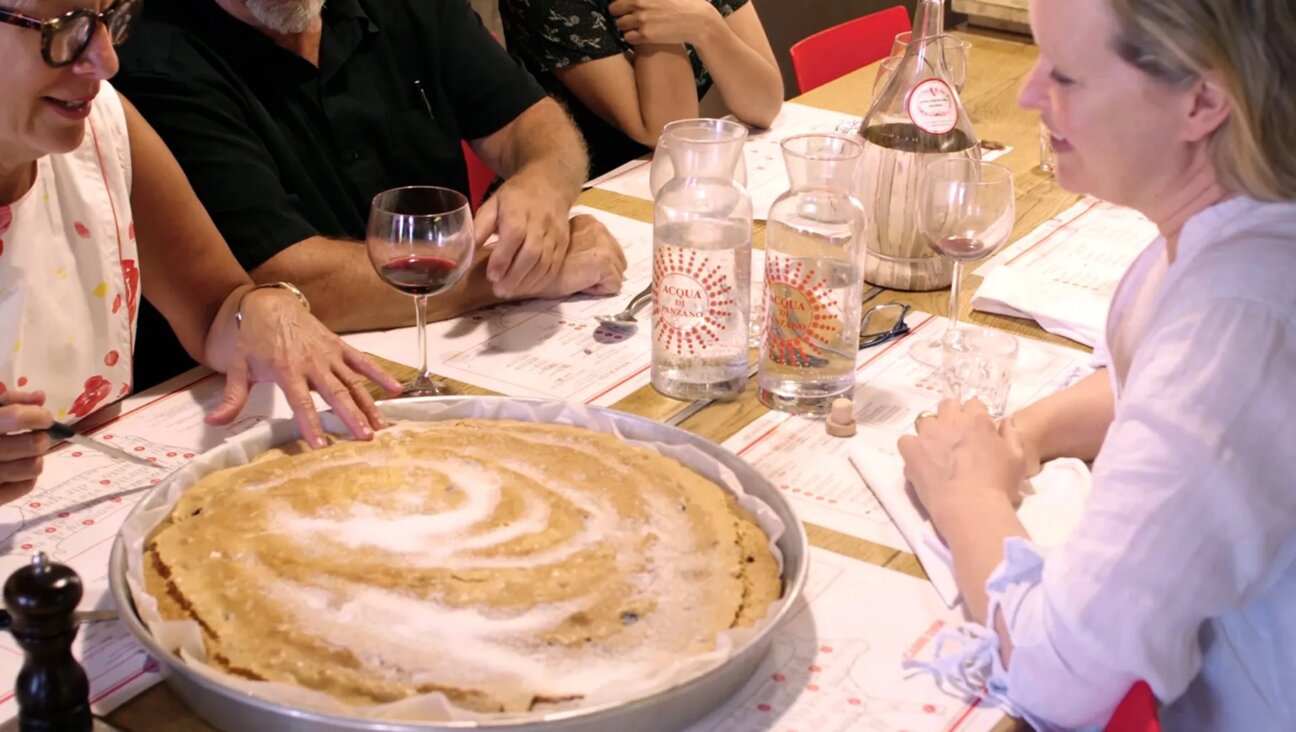How to Start a Kindness Revolution — With Cookies

This multigrain chocolate chip cookie with sea salt, from Dorie Greenspan’s new ‘Cooking With Dorie’ cookbook, could help change the world. Image by Gayle L. Squires
My late grandmother used to keep a package of store-bought cookies in the glove compartment of her car. Whenever she drove through a tollbooth or stopped to fill up her tank, she’d offer the attendant a cookie, or three. I have no doubt that she’d have been friends with four-time James Beard Award-winning cookbook author Dorie Greenspan, who has been baking cookies for as long as she can remember and who is waging a kindness war with cookies as ammunition.
Related
“I’ve just been caught up in the news and the state of things and thinking that the world is a pretty wobbly place right now,” Greenspan told me over the phone a few weeks before the election — a wobbly time indeed — and about a month before Thanksgiving — a holiday that should give families and communities a chance to cook together and share food and thoughts around the table.
“I realized how happy I am when I’m baking, how happy I am when I’m sharing what I bake, and how happy the recipient is. So I thought we need cookies now more than ever,” Greenpan said. “I had this crazy idea to start a sweet revolution to get people to bake and to share what they bake. I call it the cookies and kindness project.”

Dorie Greenspan Image by Davide Luciano
Here’s how it works: Bake cookies, share them with someone or several someones, post to Instagram or Twitter or wherever else you’d like, tag with #cookiesandkindness and #doriescookies, and make the world a little sweeter. And it gets even better — read on.
Armed with the over 160 recipes in Greenspan’s latest cookbook “Dorie’s Cookies,” you can’t help but join the revolution. This book stretches the concept of what a cookie can be — there are bar cookies, savory cookies, ones that accompany cocktails and even one that was inspired by a cocktail. Greenspan told me she enjoyed figuring out how to “cookie-fy” anything.
If you’ve used any of Greenspan’s other books, you know that you’ll feel like there’s a little Dorie fairy flitting around your kitchen, anticipating any questions you might have and answering them before you even think to ask. Greenspan shares this writing style with the late Julia Child, with whom she frequently collaborated.
She joked, “When Julia said, ‘I want you to write my book “Baking with Julia” because you write like me,” I asked, ‘You mean, because I write long recipes?’ and she said, ‘No, I mean detailed, detailed.’” With the repetition of the word “detailed,” Greenspan’s voice rose and warbled.
She recounted this story last month at the 92nd Street Y to Charlotte Druckman, author of and “Skirt Steak: Women Chefs on Standing the Heat and Staying in the Kitchen.” In front of a room packed with adoring fans clutching copies of the Greenspan’s purple-cloaked book, the two women, sporting nearly matching pixie haircuts and silk scarves — Druckman’s twisted around her wrist paying homage to Greenspan’s signature foulard — perched on stools and discussed baking, differences between French and American cookies, and general cookbookery.
There was talk of “mother doughs” — akin to the five mother sauces that are the essential building blocks for classic French cooking — and Greenspan pointed to her book’s vanilla and chocolate “do-almost-anything” recipes that she likens to a blank canvas or a dressmaker’s muslin. A description of the meticulous testing that Greenspan does for all her cookies, trying different types of ingredients, ovens (gas, electric, convection), baking times, and any other variables that could impact the outcome. A dialogue on how cookies palates and recipes have changed due to access to better cocoa and chocolate, an appreciation of vanilla as a flavor rather than mere flavoring, and the use of salt — now measured in teaspoons rather than pinches — as a seasoning for sweets. And a tongue-in-cheek exegesis on what a cookie is and can be.
Prompted by a question from the audience, Greenspan turned to a cause that enables her sweet revolution to have tangible and measurable impact on the world. From the back of the room, a woman waved her hand and asked, “Can you talk more about cookies for kindness and your involvement with Cookies for Kids’ Cancer?”
Part II
Related
Gayle Squires is a food writer, recipe developer and photographer. Her path to the culinary world is paved with tap shoes, a medical degree, business consulting and travel. She has a knack for convincing chefs to give up their secret recipes. Her blog is KosherCamembert





















